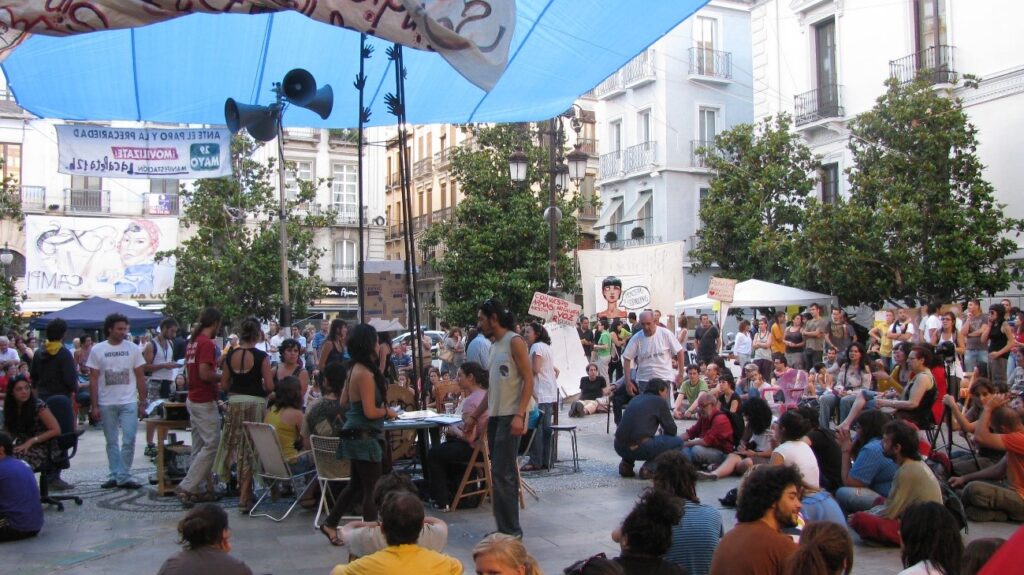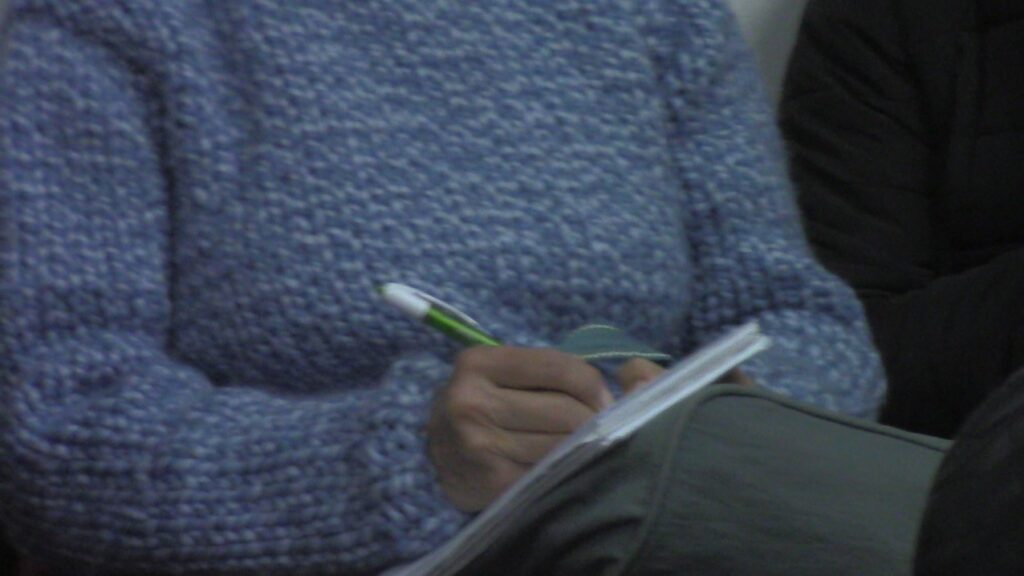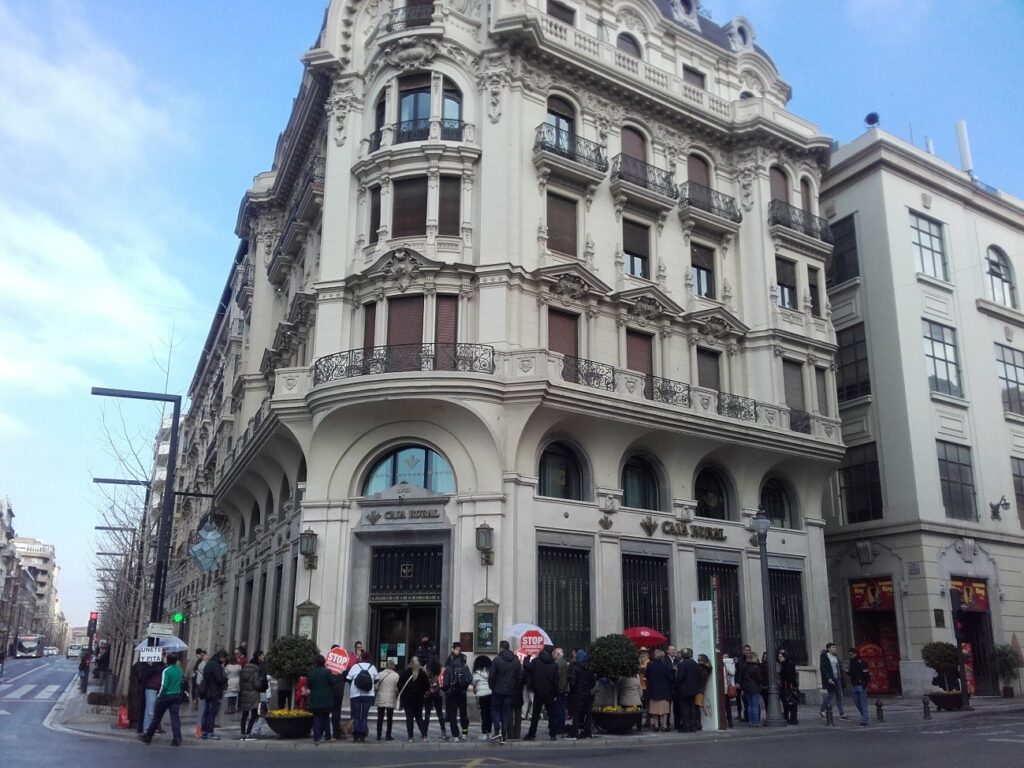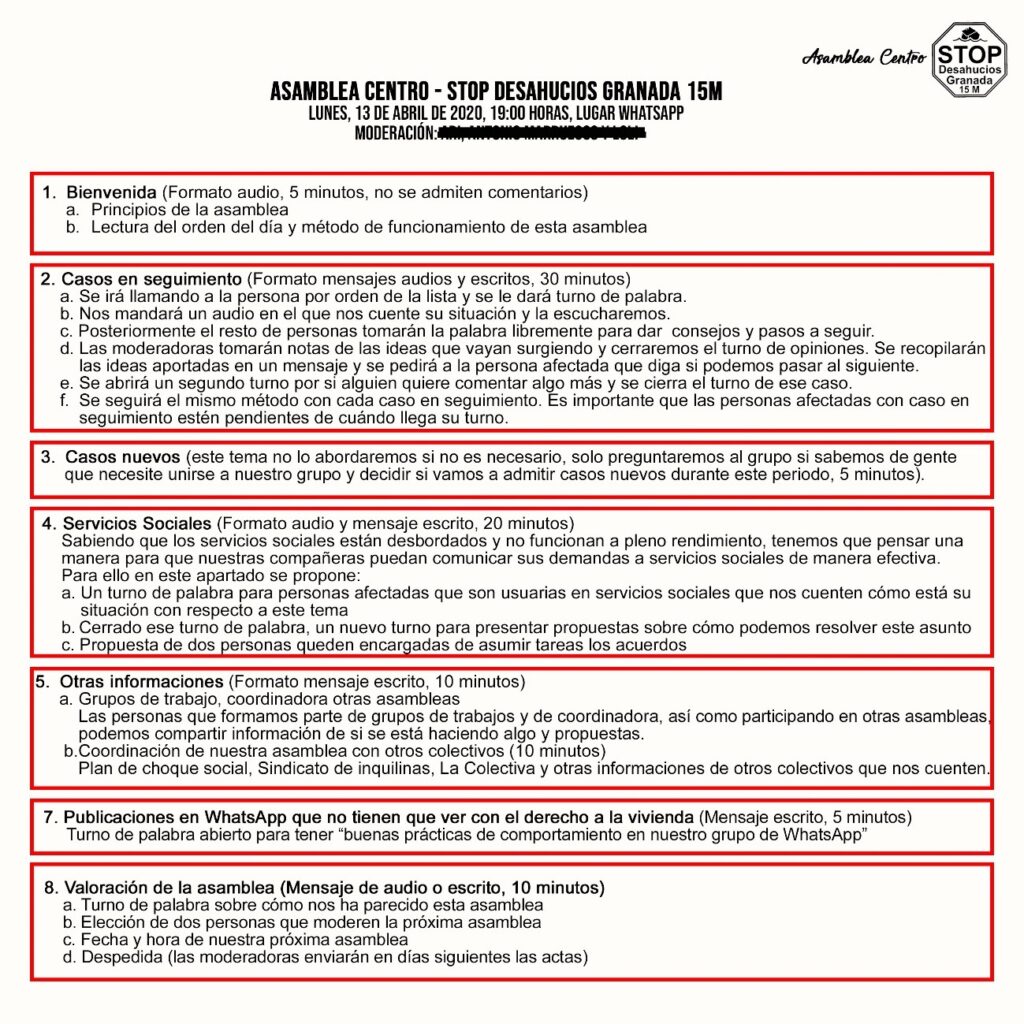About us and what we do
Stop Evictions Granada 15M – Central Assembly
Article 471 of the Spanish Constitution adopted in 1978 says: “All Spaniards have the right to enjoy decent and adequate housing. Public authorities shall promote the necessary conditions and put in place the relevant regulations to ensure this right is enforced, including regulating the use of land in accordance with the general interest to prevent speculation. The community will benefit from the capital gains generated by the urban action of the public authorities.”
Stop Evictions Granada 15M is a social movement that fights for the right to housing in general, and for the rights of families in our city to not lose their home. We were born during the 15M movement, also known as “the Indignados Movement”. This was a series of citizen protests and actions, that emerged from the demonstrations of 15 May 2011 when civil and community groups around Spain spontaneously camped in squares in different cities and protested peacefully for a better democratic system in which citizens had more power.
Stop Evictions Granada shares the principles and values of the 15M movement. Our motto “Real right to decent housing as a social and non-economic good” was invoked for the first time a week after the 15M protests took place in Granada.
We called for the suspension of the obligation for unemployed people to pay mortgage loans and for ending evictions. The Stop Evictions Working Group was established in September 2011 as a part of the larger 15M movement. However, we continued organizing assemblies in the same square in Granada after the 15M no longer existed.

Acampada 15M Granada
The problem with the right to housing in Spain is real and much more serious than is documented. For instance, in 2019 alone, there were 55,000 evictions in Spain, of which more than 36,000 resulted from non-payment of rent and almost 15,000 from mortgage defaults. And the numbers seem to be increasing rapidly with just 6,000 evictions of squatters and illegal occupiers in 2018 (Source: General Council of the Judiciary).
These are alarming ‘figures of shame’ particularly when it is estimated that almost 3 ½ million dwellings are empty in Spain and almost 250,000 of these are owned by vulture banks and investment funds. As these millions of dwellings sit empty at least 60,000 public sector homes are needed to provide homes for those cannot access conventional rental properties. And this number would be a bare minimum – only meeting the European average of 3.8 dwellings per 100 inhabitants. Currently Spain has only 0.5 available dwellings per 100 inhabitants (Eurostat Source/ Housing and Soil Observatory and Spanish National TV (TVE)).
Our movement advocates for families who, because of the lack of affordable housing, cannot afford their mortgage payments or rents; have no possibility of accessing a house in the market; or decide to inhabit a disused property owned by a vulture bank or fund. All these families are at risk of being evicted and Stop Evictions Granada offers support.
Stop Evictions is a non-hierarchical assembly – a political movement not attached to a formal political party that organizes collectively to resist these evictions. We don’t consider ourselves victims of eviction. Instead, we reject the label of passive victims, seeing ourselves instead as affected by housing injustice and emphasizing the opportunity for collective action to “repair’ or change the situation. This “repair in common” is a process that runs through our assemblies, the way we work together, and how our action in the public space.

Una compañera tomando notas de los casos durante nuestra asamblea
The weekly assembly is attended by 20-50 people. Every week a different person chairs the session. First, our principles and values are restated and the agenda is agreed. Secondly, affected families and the members of Stop Evictions Granada 15M who have agreed to support them, update and discuss their cases. Third, new cases are presented. Fourth, information is shared from other assemblies (in our province there are 11 assemblies) and their working groups, including information about wider proposals for actions, etc.
We choose to present existing cases before new cases for pedagogical and caring reasons. We think that listening to the experiences of families who are already involved in action, helps the group and, new families in particular, to move from framing the problem as a personal domestic issue to a collective public problem.
Our collective actions in public spaces are geared mainly at banks responsible for evictions or public institutions for failing to take responsibility for preventing evictions and not treating them as a social problem.
Often members of other social movements in the city join our public actions and together we try to remind those who are responsible for the evictions as well as all residents of Granada that the right to housing enshrined in the constitution has yet to be achieved in our city.

Acción ante un banco que iba a desahuciar a un compañero y su familia
With almost a decade of experience sustaining our movement, COVID-19 has been a setback not only for health, social and economic wellbeing but also for our way of organizing and working.
Although evictions have been temporarily suspended while the courts stopped working, just in autumn 2020 our assembly faced four evictions from housing owned by vulture banks and investment funds. Our collective work managed to paralyze 3 of them. In one case the institutions looked for alternative housing. However, for a movement like ours where weekly assemblies are essential, the impossibility of holding these face to face has forced us to re-organize ourselves. We had to find alternative ways to make assemblies accessible. For instance, we have used WhatsApp since our group is too large group to have video calls and not all members have digital resources to participate. Although we miss “being together and doing things together,” we’ve still managed to take some collective actions in the public spaces we’ve been able access always maintaining physical distance from safety.

Propuesta de metodología asamblearia por WhatsApp
As members of The Other Front Line global alliance supported by the Andalusian School of Public Health, we want to tell the stories of some of the families that have participated in our assemblies.
We want to show how they managed the collective struggle to defend their right to housing. The stories will demonstrate how the experience of eviction damages health and worsens existing health conditions. Yet, at the same time, they tell how processes of support and care between people working collectively to overcome their situation provides them with tools and social networks. This can have a healing effect or at least makes visible and elicit the pain and suffering that is shared by so many other families. Our vision is that participating in The Other Front Line Alliance will help us amplify and disseminate our claims for the right to a home, to raise awareness of the health effects of an eviction experience and to promote changes that force institutions to address the structural problem arising from the absence of a real and effective right to housing.
Spanish version
SOBRE NOSOTROS Y LO QUE HACEMOS
Stop Desahucios Granada 15M – Asamblea Centro
Artículo 47: Todos los españoles tienen derecho a disfrutar de una vivienda digna y adecuada. Los poderes públicos promoverán las condiciones necesarias y establecerán las normas pertinentes para hacer efectivo este derecho, regulando la utilización del suelo de acuerdo con el interés general para impedir la especulación. La comunidad participará en las plusvalías que genere la acción urbanística de los entes públicos» (Constitución Española de 1978. Título I. De los derechos y deberes fundamentales. Capítulo tercero. De los principios rectores de la política social y económica).
Stop Desahucios Granada 15M somos un movimiento social que lucha por el derecho a la vivienda en general y por el derecho a que ninguna familia en nuestra ciudad pierda su vivienda en particular.
Nacimos durante el Movimiento 15M y seguimos compartiendo sus principios y valores. Una semana después de la manifestación inaugural de L@s indignad@s, en la acampada de nuestra ciudad se reivindicó por primera vez «Derecho real a la vivienda digna, como bien social y no económico. Suspensión de la obligación de pago de créditos hipotecarios para trabajadores desempleados y fin de los desahucios». Al volver del verano en septiembre de 2011, se constituyó el Grupo de Trabajo Stop Desahucios dentro del Movimiento y cuando el 15M ya no existía, aún nuestro grupo siguió por mucho tiempo organizando las asambleas en la misma plaza.
En 2019 hubo en España 55 mil desahucios, más de 36 mil por impago de alquiler y casi 15 mil por impagos hipotecarios, mientras que los desahucios por okupación (usurpación) solo contamos con datos de 2018 y apenas superaron los 6000 (Fuente: Consejo General del Poder Judicial). Así mismo en España se calcula que hay casi 3 millones y medio de viviendas vacías, de las cuales casi 250 mil están en manos de bancos y fondos de inversión y también se estima que serían necesarias al menos 60 mil viviendas sociales para cubrir a la población que no puede acceder al alquiler convencional. Esta cifra solo nos ajustaría a la media europea (3,8 viviendas por cada 100 habitantes), ya que España solo hay 0,5 por cada 100 habitantes (Fuente Eurostat/ Observatorio de la vivienda y el suelo y TVE).
El problema con el derecho a la vivienda en España es real y mucho más grave de lo que se documenta. Nuestro movimiento está conformado por familias que no pueden hacer frente al pago de sus hipotecas o rentas de alquiler o que no tenían posibilidad de acceder a una vivienda en el mercado y que, ante la inexistencia de vivienda social pública y asequible, deciden habitar un inmueble en desuso propiedad de un banco o fondo buitre. Todas estas familias están en riesgo de ser desahuciadas cuando acuden a Stop Desahucios.
Stop Desahucios somo un movimiento político asambleario, horizontal y apartidista que nos valemos de la organización colectiva para hacer frente a estos desahucios. En lugar de considerarnos víctimas de desahucios, siempre nos nombramos como afectadas, lo que supone rechazar una condición pasiva individual para activar un horizonte de reparación en común. Este “repararnos en común” es un proceso que atraviesa nuestras asambleas, acompañamientos y cuidados y acciones en el espacio público.
A la asamblea semanal acudimos entre 20 y 50 personas. Cada semana una persona se encarga de su moderación. En primer lugar se da la bienvenida y se nombras los principios y valores y el orden del día. En segundo lugar, damos paso a los casos en seguimiento donde cada familia afectada y personas que acompañan su caso nos cuentan en qué situación se encuentra. En tercer lugar, se presentan los casos nuevos. En cuarto lugar, se dan informaciones de otras asambleas (en nuestra provincia hay 11 asambleas) y grupos de trabajo, propuestas de acciones, etc. La razón por la que los casos en seguimiento preceden a los casos nuevos tiene una función de cuidados y pedagógica, porque al escuchar a otras familias contar lo que hasta ahora había sido un asunto doméstico, se abre un potencial a tejer en colectivo, pasando de un problema privado a hacerse cargo en común.
Las acciones en el espacio público son principalmente ante las puertas de bancos responsables de desahucios o ante instituciones pública por des-responsabilizarse por un problema social. Allí nos encontramos todas las asambleas, a menudo también acuden otros movimientos sociales de la ciudad y juntos tratamos de recordarle a quienes son responsables de los desahucios así como al conjunto de la ciudadanía, que el derecho a la vivienda en nuestra ciudad aún está por conquistar.
Con casi una década de trayectoria sosteniendo nuestro movimiento, la COVID 19 supuso un revés no solo sanitario, social y económico sino también para nuestro propio modo de hacer. Aunque los desahucios quedaron temporalmente suspendidos, al paralizarse la labor judicial, este otoño solo nuestra asamblea ha tenido que hacer frente a cuatro desahucios donde las viviendas son propiedad de bancos y fondos buitres. Nuestro trabajo colectivo ha conseguido paralizar 3 de ellos y en un caso se ha conseguido que las instituciones busquen una alternativa habitacional.
Sin embargo, para un movimiento como el nuestro donde las asambleas semanales son imprescindibles, no solo por la lucha contra los desahucios, sino también por el acompañamiento y cuidado a la familias, la imposibilidad de reunirnos nos ha forzado a reiventarnos. Tuvimos que crear una metodología para hacer asambleas por WhatsApp, ya que somos un grupo muy numeroso para tener vídeollamadas y no todas las personas compañeras cuentan con recursos digitales para llevarlas a cabo. Aunque echamos de menos “estar juntas y hacer cosas juntas”, hemos llevado algunas acciones colectivas en el espacio público en las que hemos podido encontrarnos, con distancia física de seguridad.
En esta aventura propuesta por la Escuela Andaluza de Salud Pública, queremos narrar relatos de distintas familias de nuestras asambleas desde que acuden a nuestro colectivo, recorriendo la lucha por defender su derecho a la vivienda, haciendo hincapié en el modo en que la vivencia de una situación de desahucio produce situaciones de perjuicio de la salud y empeoramiento de las enfermedades previas y al mismo tiempo, cómo los procesos colectivos de acompañamiento y cuidado para que las personas se hagan cargo de la situación y adquieran herramientas y apoyo para solucionar su problema con la vivienda, tiene un efecto sanador o cuanto menos de hacer visible y explícito dicho dolor y sufrimiento que es compartido por tantas otras familias.
Como fin último, nuestro colectivo entiende que participar en este proyecto nos puede ayudar a amplificar y desplegar nuestras reivindicaciones para sensibilizar a la sociedad sobre los efectos que sobre la salud tiene la vivencia de una situación de desahucio y promover cambios que impulsen a las instituciones a hacerse cargo del problema estructural derivado de la ausencia de derecho real y efectivo a la vivienda.
![Other Front Line [logo]](https://otherfrontline.org/wp-content/themes/otherfrontline/assets/img/ofl-logo-colour.svg)
